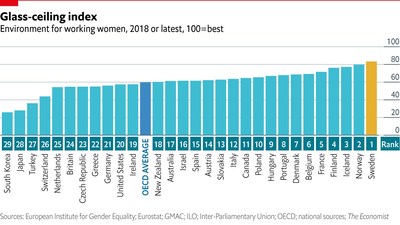The annual index ranks the best and worst OECD countries to be a working woman
LONDON, March 8, 2019 /PRNewswire/ -- Despite growing attention to the gender pay gap, the MeToo movement and calls to improve opportunities for women in the workplace over the past year, The Economist's 2019 glass-ceiling index (GCI) suggests that progress for women in the workplace has stalled. The GCI is a yearly assessment of where women have the best and worst chances of equal treatment at work in countries in the Organisation for Economic Co-operation and Development (OECD), a group of mostly rich countries.

The GCI, which combines data on higher education, labour-force participation, pay, child-care costs, maternity and paternity rights, business-school applications and representation in senior jobs to create a ranking of 29 OECD countries, shows that the Nordic countries are still the best places to work if you are a woman. The Nordics are particularly good at helping women complete university, secure a job, access senior positions, and take advantage of quality parental-leave systems and flexible work schedules.
Turkey, Japan and South Korea continue to rank as the worst places to be a working woman in The Economist's glass-ceiling index. Societal norms in Asia still expect women to choose between having a family or a career.
The index does reflect a few bright spots this year, including women in governmental positions of power. Spain's prime minister appointed the first female-majority cabinet since the country returned to a democracy in 1975. More American women than ever were voted into Congress during the 2018 mid-term elections. Theresa May and Angela Merkel still hold their respective countries' highest office, which may inspire more women to run for election.
Highlights of this year's index:
- The gender pay gap remains largely unchanged at around 14%
- The share of women in the labour force has crept slightly higher to 64%, but this is still 16 percentage points below the male average
- The share of women in management has flatlined since last year at 32%
- Fewer women took the GMAT business-school entry exams, but this is in line with an overall fall in both men and women taking the test
- The share of women on company boards slightly increased to 23%
This is the seventh year that The Economist has released its glass-ceiling index. When it was launched in 2013 there were five indicators and 26 countries; today it consists of ten indicators including maternity and paternity leave for 29 OECD countries.
To view the full interactive index, please visit: https://www.economist.com/graphic-detail/2019/03/08/the-glass-ceiling-index
The glass-ceiling index 2019
Best and worst OECD countries to be a working woman
1Sweden
2Norway
3Iceland
4Finland
5France
6Belgium
7Denmark
8Portugal
9Hungary
10Poland
11Canada
12Italy
13Slovakia
14Austria
15Spain
16Israel
17Australia
18New Zealand
19Ireland
20United States
21Germany
22Greece
23Czech Republic
24Britain
25Netherlands
26Switzerland
27Turkey
28Japan
29South Korea
About The Economist
With a growing global audience and a reputation for insightful analysis and perspective on every aspect of world events, The Economist is one of the most widely recognised and well-read current affairs publications in the world. In addition to the weekly print and digital editions and website, The Economist publishes Espresso, a daily news app, Global Business Review, a bilingual English-Chinese product and Economist VR, a virtual-reality app. Economist Radio produces several podcasts a week and Economist Films produces short- and long-form video. The Economist maintains robust social communities on Facebook, Twitter, LinkedIn, Snapchat, LINE, Medium and other social networks. A recipient of many editorial and marketing awards, The Economist was named the most trusted news source by the 2017 Trusting News Project Report.

Photo - https://mma.prnewswire.com/media/832553/The_Economist_glass_ceiling_index_2019_Infographic.jpg
Logo - https://mma.prnewswire.com/media/624588/The_Economist_Logo.jpg

